|
|
|
Sort Order |
|
|
|
Items / Page
|
|
|
|
|
|
|
| Srl | Item |
| 1 |
ID:
182687
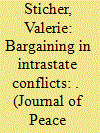

|
|
|
|
|
| Summary/Abstract |
Research shows that conflict parties engage in ceasefires in pursuit of a variety of objectives, some of which reduce while others fuel violent conflict. This article provides a framework that links these objectives to a larger process. Building on bargaining theory, three distinct bargaining contexts are specified for intrastate conflicts. In the Diminishing Opponent context, leaders believe that a military solution yields a better outcome than a political settlement. In the Forcing Concessions context, they recognize the benefit of conflict settlement, but expectations about a mutually acceptable agreement still widely diverge. In the Enabling Agreement context, expectations converge, and leaders seek to pursue settlement without incurring further costs. In line with these readings, conflict party leaders adapt their strategic goal, from seeking to set up a military advantage, to boosting their bargaining power, to increasing the chances of a negotiated settlement. They may use ceasefires in the pursuit of any of these three goals, shifting the function of a ceasefire as they gain a better understanding of bargaining dynamics. A comparison of violence and ceasefire patterns in six contemporary peace processes and a congruence test conducted on the 2012–16 peace negotiations between the Colombian government and the guerilla organization FARC offer support for the theoretical framework. The findings highlight the important, and shifting, role ceasefires play in the transition from war to negotiated peace.
|
|
|
|
|
|
|
|
|
|
|
|
|
|
|
|
| 2 |
ID:
108846
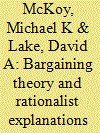

|
|
|
| 3 |
ID:
173211


|
|
|
|
|
| Summary/Abstract |
A bargaining framework and a measure of conflict polarization are developed from two elements: (i) hatred-based negative externalities experienced by the parties to the conflict, and (ii) penalties the parties impose on their delegated negotiators when concessions are made in the bargaining process. The framework establishes agreement and disagreement regions and it is shown that a necessary condition for a negotiated solution is the adoption of a dual policy that combines dissociative political and military strategies. This analytical approach is applied first to polarized conflicts generally and then to the specific case of the internal conflict in Colombia between that country’s government and the FARC guerrilla group. The model provides a rationale for the complex dynamic of Colombia’s current peace process, which has involved a preliminary agreement and its subsequent rejection in a national referendum. Our analysis highlights the successful dissociative political-military strategy followed by the negotiators that enabled them to reach the agreement and the negotiators’ underestimation of the hatred levels that led the majority of the Colombian society represented in the referendum to vote the agreement down because they considered the concessions made by the government too generous to be acceptable.
|
|
|
|
|
|
|
|
|
|
|
|
|
|
|
|
| 4 |
ID:
117027
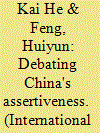

|
|
|
|
|
| Publication |
2012.
|
| Summary/Abstract |
Engaging the recent debate on China's assertive foreign policy, we suggest that it is normal for China - a rising power - to change its policy to a confident or even assertive direction because of its transformed national interests. We argue also that it is better to understand future US-China relations as a bargaining process. Whereas China negotiates for a new status in the system with redefined interests, the United States and other countries need to adjust their old political practices. China's 'core interest' diplomacy launched in 2009 is the first step in revealing 'private information' for peaceful bargaining with the outside world. A status quo foreign policy is not a wise choice for the United States because of the changing power and interest configurations in the international system.
|
|
|
|
|
|
|
|
|
|
|
|
|
|
|
|
| 5 |
ID:
110006


|
|
|
|
|
| Publication |
2011.
|
| Summary/Abstract |
The basic narrative of bargaining theory predicts that, all else equal, anarchy favors concessions to challengers who demonstrate the will and ability to escalate against defenders. For this reason, post-9/11 political science research explained terrorism as rational strategic behavior for non-state challengers to induce government compliance given their constraints. Over the past decade, however, empirical research has consistently found that neither escalating to terrorism nor with terrorism helps non-state actors to achieve their demands. In fact, escalating to terrorism or with terrorism increases the odds that target countries will dig in their political heels, depriving the non-state challengers of their given preferences. These empirical findings across disciplines, methodologies, as well as salient global events raise important research questions, with implications for counterterrorism strategy.
|
|
|
|
|
|
|
|
|
|
|
|
|
|
|
|
| 6 |
ID:
083037
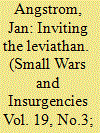

|
|
|
|
|
| Publication |
2008.
|
| Summary/Abstract |
This article examines the role of intervening forces in state-building efforts after state-collapse and civil wars. Based upon a case study from the 30 years of war in Afghanistan, it develops an explanation for failure of state-building attempts drawing upon bargaining theory, macrosociological state-building theory, and strategic thought. The explanation suggests that international state-building attempts condition and shapes a new strategic environment for the local actors. In doing so, the mode of state-building can create incentives for continuing the war or, carried out differently, create incentives for the parties to contribute in building a legitimate state from the rubble of the old state.
|
|
|
|
|
|
|
|
|
|
|
|
|
|
|
|
| 7 |
ID:
167453
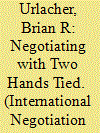

|
|
|
|
|
| Summary/Abstract |
Theories of conflict resolution often posit unified actors as a simplifying assumption. In practice conflict actors often struggle to balance competing factions and centers of power. Schelling and Putnam have argued that factors that constrain what a negotiator can accept are a potential source of leverage in a bargaining process, yet a counter argument suggests that leaders seeking to negotiate, while facing divided government, may be less able to credibly signal their intentions. Drawing on event data from nearly 3,000 conflict-months, this paper analyzes the frequency of concessions offered by both rebels and governments. This study finds evidence that a fractured decision-process results in both rebels and governments making more concessions. Further corroboration is provided through a case study of the Philippine government’s efforts to negotiate an end to the conflict in the Mindanao region.
|
|
|
|
|
|
|
|
|
|
|
|
|
|
|
|
| 8 |
ID:
101884
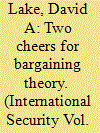

|
|
|
|
|
| Publication |
2011.
|
| Summary/Abstract |
The Iraq War has received little sustained analysis from scholars of international relations. I assess the rationalist approach to war-or, simply, bargaining theory-as one possible explanation of the conflict. Bargaining theory correctly directs attention to the inherently strategic nature of all wars. It also highlights problems of credible commitment and asymmetric information that lead conflicts of interest, ubiquitous in international relations, to turn violent. These strategic interactions were central to the outbreak of the Iraq War in 2003. Nonetheless, bargaining theory is inadequate as an explanation of the Iraq War. Although the problem of credible commitment was real, it could not be solved because of the prior beliefs of the Bush administration that Saddam Hussein was uniquely evil and because of Saddam's inability to signal accurately to multiple audiences, both factors now outside bargaining theory. Nor was the problem of private information an important impediment to bargaining; rather, the information failures observed in both Washington and Baghdad were of their own making as each formed self-deluding beliefs and expectations. Bargaining theory also ignores postwar governance costs and domestic interest groups, both of which contributed to the war. All of these problems require either considerable amendments to the theory or the revision of core assumptions. Drawing on this critique, the final sections draw out the analytic and policy lessons of the Iraq War and suggest, most importantly, the need for a new behavioral theory of war.
|
|
|
|
|
|
|
|
|
|
|
|
|
|
|
|
|
|
|
|
|